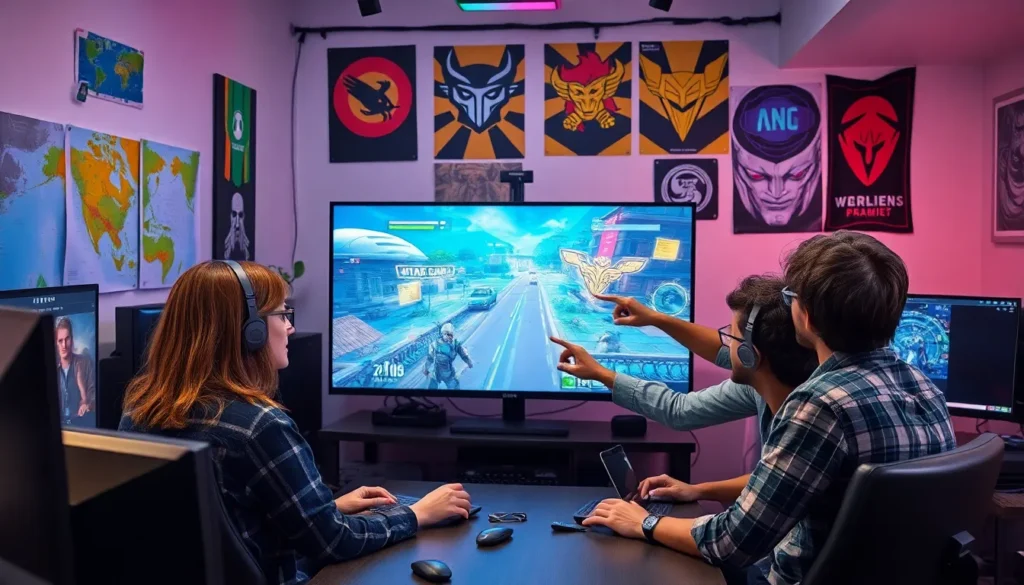Table of Contents
ToggleIn the ever-evolving world of gaming, staying ahead of the curve is crucial, and that’s where game engine upgrades come into play. Imagine trying to run a high-speed car race in a clunky old jalopy—it just won’t cut it! Upgrading your game engine is like swapping that rust bucket for a sleek sports car, giving developers the power to create stunning visuals and immersive experiences that keep players coming back for more.
Overview of Game Engine Upgrades
Game engine upgrades enhance game development efficiency and quality. Developers access improved tools and features, which streamline workflows. Greater graphics capabilities result from these upgrades, allowing for impressive visuals that captivate players. Enhanced physics engines provide increased realism, affecting how characters and objects interact within the game world.
Many game engines, including Unreal Engine and Unity, receive regular updates that introduce innovative technologies. A noteworthy example includes Unreal Engine’s Nanite and Lumen features, delivering advanced rendering techniques. These updates cater to the industry’s evolving requirements and help align games with current trends, such as immersive virtual reality experiences.
Upgrading often improves performance, addressing previously encountered limitations. Reduced loading times lead to smoother gameplay, while optimized code contributes to better hardware utilization. Players notice faster frame rates, enhancing their overall experience during intense gaming sessions.
Security enhancements accompany many upgrades, ensuring that games remain protected against potential threats. Outdated engines may harbor vulnerabilities, making upgrades critical for safeguarding both developers and players. Following these updates can help mitigate risks associated with game vulnerabilities.
Additionally, upgrading allows developers to access new asset libraries and communities. These resources foster collaboration and creativity while elevating the overall quality of games. Game engines’ upgrades undoubtedly play a significant role in shaping the gaming landscape, making them essential for developers aiming to create engaging, next-generation gaming experiences.
Benefits of Upgrading Game Engines

Upgrading game engines provides essential advancements that benefit developers and players alike.
Improved Performance
Game engine upgrades significantly boost performance. Enhanced loading times and frame rates create smoother gameplay experiences. Developers benefit from optimized code that maximizes hardware capabilities, ensuring efficient resource utilization. For instance, newer engines often employ better multi-threading support which allows for more tasks to execute simultaneously. By focusing on these updates, developers can achieve higher levels of realism and responsiveness in their games. Enhanced performance also contributes to a more enjoyable gaming experience, where players engage more deeply without technical interruptions.
Enhanced Graphics
Upgrading to modern game engines unlocks advanced graphics capabilities. Features such as real-time ray tracing and higher resolution textures elevate visual fidelity. Developers gain access to tools that dramatically improve lighting and shading techniques, creating lifelike environments. Modern engines like Unreal Engine and Unity offer cutting-edge technology that aligns with current visual trends, appealing to players’ aesthetic senses. Enhanced graphics not only captivate audiences but also enhance storytelling through immersive visuals. As a result, well-designed characters and environments draw players into the game’s narrative, creating unforgettable experiences.
Popular Game Engine Upgrades
Game engine upgrades are essential for staying competitive in the gaming industry. They provide developers with the latest tools and technologies to create engaging experiences.
Unity Upgrades
Unity frequently releases updates that enhance its capabilities. Major improvements include augmented reality tools and improved lighting systems, which enrich visual quality. Recent Unity features also streamline workflows via enhanced collaboration tools, enabling teams to work more efficiently. The integration of the Visual Scripting feature simplifies programming, allowing non-coders to contribute effectively. Performance improvements in rendering speed help optimize gameplay, leading to smoother experiences for players. Unity’s support for adaptive music systems further elevates gameplay by creating immersive audio environments.
Unreal Engine Upgrades
Unreal Engine consistently introduces advancements that redefine game design. Freely incorporating features like Nanite boosts polygon count management, granting artists unprecedented detail. Lumen enhances real-time global illumination, significantly improving light handling. Upgrades include support for advanced AI and machine learning, enabling more responsive and intelligent characters. Enhanced animation tools provide smoother transitions and lifelike movements, captivating players. Direct support for next-generation consoles ensures games reach their maximum potential on modern hardware, elevating overall performance.
Considerations Before Upgrading
Before upgrading a game engine, several key considerations emerge. Developers must evaluate the compatibility of the new engine version with existing projects and assets. Significant changes in architecture may lead to challenges when integrating older content. Testing thoroughly on a sample project can identify potential conflicts and minimize disruptions.
Balancing cost against benefits is crucial. While upgrades often incur expenses, they provide enhanced tools and features that streamline processes. Improved rendering capabilities might significantly reduce development time, justifying the investment. Analyzing long-term goals assists in understanding whether immediate costs align with future gains.
Ultimately, developers should approach upgrades thoughtfully, weighing compatibility and cost versus benefits to maximize both productivity and quality within their projects.
Upgrading game engines is essential for developers aiming to stay competitive in the fast-evolving gaming landscape. By embracing modern features and capabilities, they can create richer and more engaging experiences that resonate with players. Enhanced performance and improved tools not only streamline development but also elevate the overall quality of games.
As technology continues to advance, the importance of regular updates cannot be overstated. These upgrades foster innovation and creativity while ensuring that games meet the expectations of today’s audience. Ultimately, a strategic approach to upgrading can lead to groundbreaking experiences that redefine the gaming industry.







